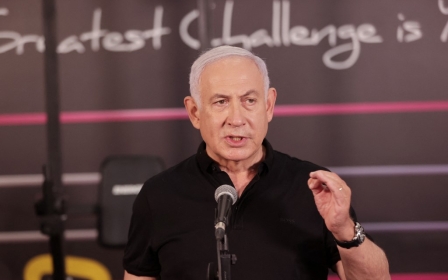Netanyahu UAE trip: Israel's PM uses Jordan as fall guy to cover up blunder

An odd concoction of a cancelled meeting between Benjamin Netanyahu and the UAE’s de facto leader Mohammed bin Zayed, and the Israeli prime minister’s wife undergoing surgery, has played a major role in further deteriorating Israel-Jordan relations.
On Thursday, Netanyahu was supposed to fly from Israel via the air spaces of Jordan and Saudi Arabia to Abu Dhabi for a short meeting with its crown prince, and reportedly perhaps Saudi Crown Prince Mohammed bin Salman.
It was not an important diplomatic mission, only a photo-op that Netanyahu had pressed bin Zayed into agreeing to in order to boost the premier’s chances in Israel’s 23 March elections.
In the previous three elections held over the last two years, Netanyahu has failed to form a solid government. Pollsters and pundits predict that the fourth elections will likely also end with the same inconclusive results. A handshake with the ruler of the UAE, which normalised ties with Israel in September, would have promoted his diplomatic credentials.

The night before the scheduled meeting, however, Netanyahu faced two problems.
Sara, Netanyahu’s wife, was diagnosed with appendicitis and the prime minister knew that he must be with her at the hospital. But it was not necessarily simply normal behaviour expected from any loving couple.
In the 1990s, Netanyahu admitted to having extramarital relations with one of his assistants. Since then, Israel has been flooded with rumours and unconfirmed reports - which last week eventually reached the mainstream media - that the couple had signed a contract securing Sara an important say in his official work. Their loyal lawyer, David Shimron, who is said to have brokered the agreement, denies the claim.
Under this supposed agreement, Sara must accompany the prime minister if he stays overnight on his foreign visits.
But more importantly, it was reported that Netanyahu had agreed that his wife would take part in important diplomatic and security deliberations and that she has the right to vet candidates for the top security jobs: the heads of intelligence agencies Mossad and Shin Bet, and the military’s chief of staff.
Whether there is such a written contract or not, it was already proven that the head of Mossad, Yossi Cohen, is remarkably close to the power couple, who some Israeli pundits have compared to Romania’s Nicolae and Elena Ceausescu.
Either way, Netanyahu sought an excuse to cancel his trip to Abu Dhabi and be with his wife, who underwent the surgery.
The excuse he found for the sudden cancellation was Jordan.
Bizarre arrangements
To complicate matters further, the logistical arrangements for the flight were rather bizarre.
Instead of chartering a jet from an Israeli company or private businessman, as he has done before, and fly from Ben Gurion airport to Abu Dhabi, Netanyahu asked Mohammed bin Zayed to send him a more luxurious plane.
For reasons unknown and difficult to understand, the crown prince sent one of his royal jets to Amman, Jordan, where it would meet an Israeli helicopter with the prime minister and fly him to Abu Dhabi.
However, the night before, while Sara was being told by doctors to have the surgery, Jordan’s Crown Prince Hussein bin Abdullah was supposed to visit and pray at the al-Aqsa Mosque in occupied East Jerusalem. According to the 1994 peace treaty with Israel, Jordan has a special status as custodian of Jerusalem’s holy sites.
Instead of chartering a jet from an Israeli company or private businessman, Netanyahu asked Mohammed bin Zayed to send him a more luxurious plane
Yet, due to some misunderstandings, a row broke out between the Jordanian security service and Shin Bet regarding some seemingly trivial issues, such as how many bodyguards would be allowed to carry arms.
But the truth was that the argument was also about national pride. Angry and feeling humiliated at the hands of the Israeli security service, the crown prince decided to cancel the visit. Furthermore, the Jordanian authorities retaliated by refusing to let bin Zayed’s jet ferry the prime minister from Amman to Abu Dhabi
Netanyahu jumped at the opportunity to be with his wife and cancelled the meeting with bin Zayed, accusing Jordan. Yet he could have easily and quickly chartered another jet and flown to Abu Dhabi via Israeli air space, the Red Sea and Saudi Arabi, circumventing Jordan altogether and adding just 20 minutes to the journey each way.
Netanyahu also punitively ordered Israeli air space closed to all planes flying out of Jordan.
Luckily, his order was ignored by Israeli aviation officials, and a few hours later Netanyahu had calmed down.
Netanyahu also vetoed a planned visit by the outgoing Israeli foreign minister, Gabi Ashkenazi, to Abu Dhabi. In other words, the Israeli prime minister’s thinking was: if I do not fly there, no one will.
Fragile relations
Nevertheless, the damage to already fragile relations between Israel and Jordan was done. The Kafkaesque incident had deeper roots in the past.
Over the last few years, political and diplomatic ties between the Hashemite kingdom and Israel have plummeted to their lowest in decades.
Netanyahu and Jordan's King Abdullah II have neither met nor spoken over the phone for a long time.
In July 2017, a Shin Bet bodyguard killed two Jordanian citizens who worked in his apartment at the Israeli embassy compound in Amman. Shin Bet head Nadav Argaman flew personally to Jordan, apologised to his counterpart and palace officials, and secured the release of the bodyguard.
Argaman promised that the release would be kept secret. Netanyahu broke the understanding, publicly spoke over the phone with the bodyguard, embraced him and praised him as a national hero.
Around the same time, after two Israeli border police troops guarding an entrance to the al-Aqsa compound were killed by a Palestinian citizen of Israel, Netanyahu ordered increased security measures and the installation of explosive and metal detectors at the gates leading to the site.
Jordan and the Palestinian Authority protested, and large demonstrations took place. Under pressure from Argaman, Netanyahu caved in. The devices were removed.
The Jordanian fury was also evident in 2019, when the kingdom refused to renew a 25-year lease allowing Israeli farmers to cultivate land in the Arava Wadi area on the Jordanian side of the border.
But what strained the relations more than anything else was Netanyahu’s plan in 2020 to annex parts of the occupied West Bank, which was halted at the last minute by then US President Donald Trump.
Intelligence and security cooperation below the surface is still solid, because the two sides need each other in the battle against commons enemies such as Hamas, the Islamic State group and Syria.
But in the open, the relations are poisonous. King Abdullah and his top advisers despise Netanyahu and feel that he is arrogant, inconsiderate and ungrateful. Many Israelis share the same view.
This article is available in French on Middle East Eye French edition.
Middle East Eye delivers independent and unrivalled coverage and analysis of the Middle East, North Africa and beyond. To learn more about republishing this content and the associated fees, please fill out this form. More about MEE can be found here.




